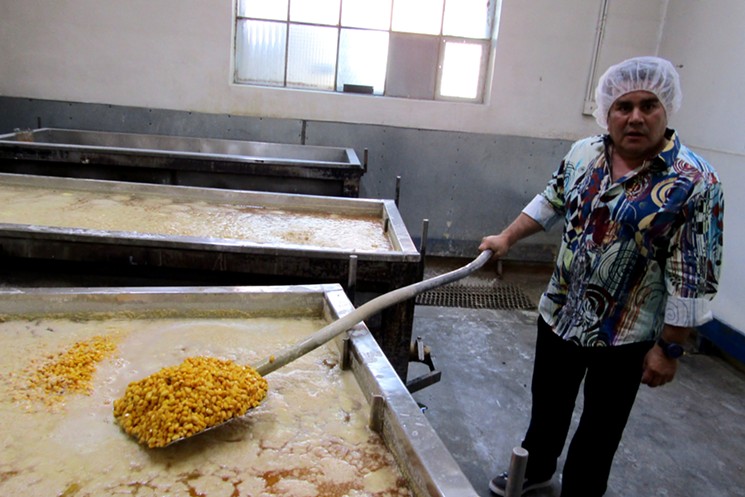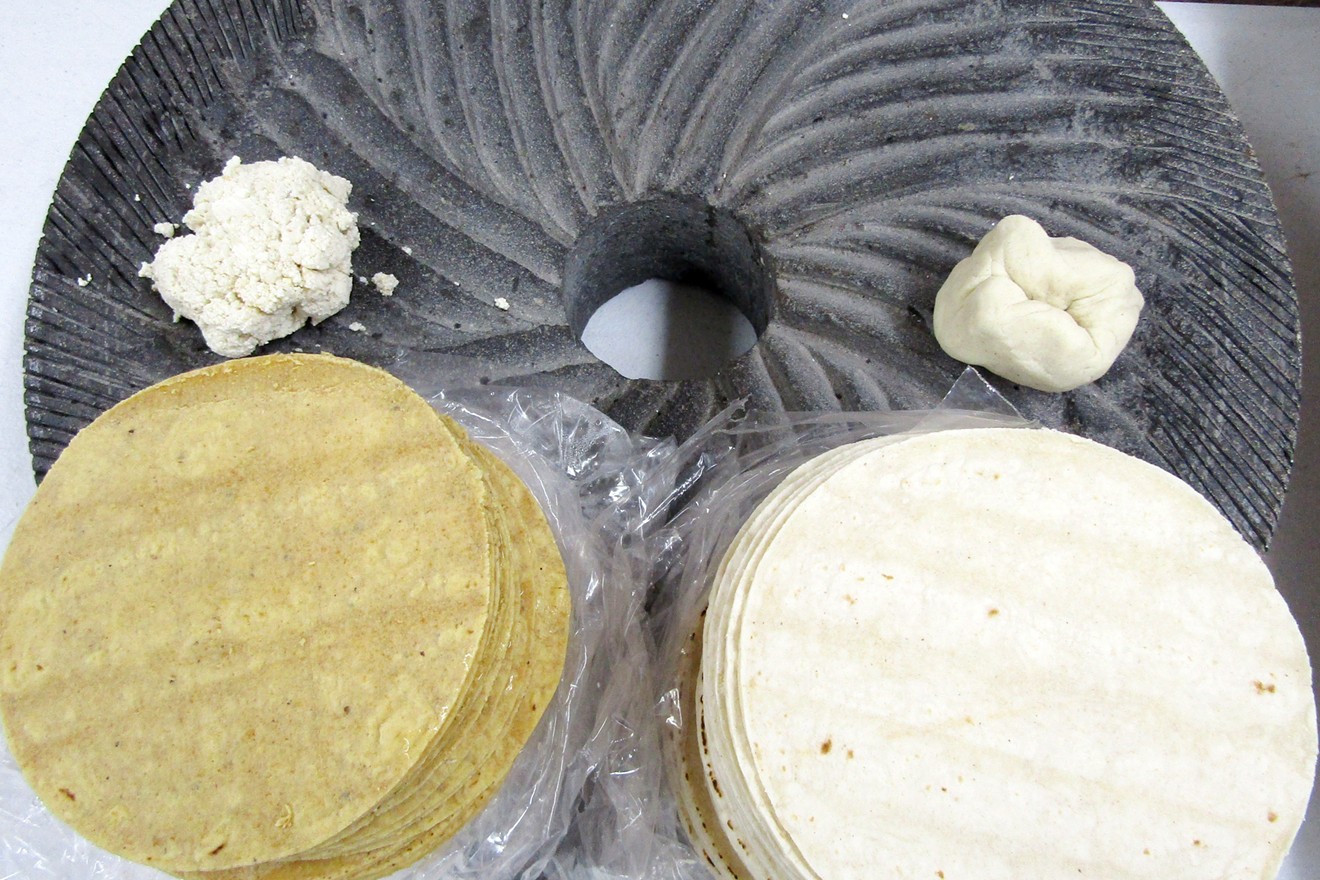Vargas came to Denver in July for Slow Food Nations, where she demonstrated the ancient and dying art of nixtamal tortillas, in which masa is made from whole dried corn kernels in a process that creates a nutritious, flavorful food that has been feeding Mexico for centuries. The advent of powdered masa (or masa harina) meant that women no longer had to spend hours cooking and grinding corn by hand, so for traditionalists like Vargas, following the old ways is a choice, not a necessity — a choice that counters the downside of masa harina with bolder flavor and better texture.
At Vargas's side was Chicago chef, restaurateur and food TV star Rick Bayless, who described the evolution of nixtamalization, which predates Hispanic Mexico. Bayless explained that nixtamalization happens when dry field corn (not the sweet, juicy stuff from Olathe that's perfectly ripe right now) is boiled and soaked with a small amount of calcium hydroxide powder (known as lime in English or cal in Spanish), which softens the corn's outer coating so that the kernels can be ground into a paste. Nixtamalization turns corn from a low-nutrient grain into a healthy staple by adding calcium and freeing up niacin for easy absorption. The process has another important benefit: It transforms what would be bland, crumbly corn meal into a flavorful, pliable dough that can be molded into thin tortillas, mixed with fat for tamales, or patted into thicker shapes like huaraches, sopes, gorditas, tlacoyos and myriad other regional specialties.

At Raquelitas, Rich Schneider shows how dry corn is soaked in lime water to soften the hulls.
Mark Antonation
That statement raised my hackles — and got me thinking. Why should a Midwestern city known for hot dogs and sloppy pizza make tortillas that are any better than what's made in Denver, where you can spot any number of tortillerias along Federal Boulevard, tucked into neighborhoods in north Denver and slotted among breweries and sausage factories in semi-industrial warehouse districts?
"Oh, Chicago is definitely a nixtamal town," says Rich Schneider, who runs Raquelitas Tortillas, one of the oldest wholesale tortilla companies in Denver, with his brother Raul DeLaTorre, and Raul's wife, Mari. Schneider occasionally travels to other cities for conventions and trade shows, and he noticed the quality of the tortillas in Chicago years ago. "This is what we should be making in Denver," he recalls thinking during that visit. "It's got a better texture, a better flavor."
Raquelitas has been making tortillas in one form or another since the 1940s, and has been in Schneider's family since 1960, when his father, Salvador DeLaTorre, bought the company. Back then it was known as La Popular and was located at 2012 Larimer Street. The family opened a second location at 2033 Lawrence Street and for a time, separate family members ran the two locations, making products somewhat independently. Eventually Salvador sold the Lawrence Street shop and the family moved their other tortilleria up to 3111 Larimer Street, its current home; Raul renamed the company Raquelitas, after his daughter, to avoid confusion with La Popular, which by this time was making a significantly different product.

These nixtamal tortillas are made just for chips, so they're thinner and dryer than taco tortillas.
Mark Antonation
Where does nixtamal fit into the Raquelitas story? Schneider explains that over the decades, Denver became a Maseca town, turning to the Mexican company's masa harina (dried and powdered masa) to make tortillas. At first it was purely an economic move; Maseca is a cheap product and all but foolproof. "It's so easy to use — you get a scale, a mixer and a water meter, and you're off to the races," Schneider notes.
But as in many other cities, even in Mexico, Maseca soon became the recognizable flavor of corn tortillas, whether in home kitchens or in restaurants. The majority of Denver tortillerias, including Raquelitas, turned to masa harina (which means Maseca, since there are very few competitors in the industry). But Schneider remembered that taste of nixtamal tortillas in Chicago, and so he and his family have continued to dedicate a small but important part of their production to making masa from whole corn.
Schneider estimates that 15 to 17 percent of the company's production is dedicated to nixtamal tortillas and chips, all of which go to restaurant accounts through Sysco Foods. For the chips, Raquelitas uses non-GMO corn from Nebraska, but for the tortillas, the company buys corn that's grown on a Ute reservation in southwestern Colorado and sold by Bow & Arrow Foods, an offshoot of the reservation's Ute Mountain Farm and Ranch, which opened in 2014.
The nixtamalization process at Raquelitas is surprisingly similar to traditional methods, only without the metate or hand-patting. Whole corn kernels are cooked in water for two hours with lime, and the corn soaks overnight in the lime water. The next day, the corn is rinsed and ground in a machine equipped with two stone wheels; the amount of rinsing changes the flavor and texture, so corn that will become chips is rinsed heavily and ground fine, while corn for tortillas is rinsed lightly and ground coarsely, giving the finished tortilla a slightly grainy appearance and a fuller flavor. The lime residue also adds a slightly mineral, earthy quality of its own. Schneider points out that tortillas made this way are a natural antacid, since the lime raises the pH level of the corn.
Over at La Popular, Daniel DeLaTorre nixtamalizes almost all of his corn for tortillas, chips, tamales and even fresh masa sold to walk-in customers from a small refrigerator in the tortilleria's retail shop. He estimates that about 2 percent of his business is Maseca tortillas, and then only at the request of specific customers. The retail shop represents only a small segment of sales; about 70 percent goes to wholesale accounts, including the tortilla chips sold at the downtown ViewHouse. So you needn't look far for nixtamal; your next lunch could be a couple of tamales smothered in thick, Denver-style green chile — to go, of course, since there's nowhere to sit inside La Popular.
One of Raquelitas' newer accounts is the Table Mountain Inn, a Southwestern hotel and restaurant in downtown Golden. Schneider is working on a triangular yellow-corn chip made with nixtamalized corn, and he's brought a box for the kitchen to sample. The restaurant is already using Schneider's nixtamal tortillas for its cantina tacos; Schneider says that modern diners prefer them because of their authentic appearance, deep flavor and color, and — nearly as important — their photographability. The golden glow of the nixtamal taco does indeed stand out next to a smooth, pale Maseca tortilla that Schneider has brought along for comparison.
These days, chefs and their customers are drawn toward the handmade, the time-honored, the local and sustainable, opening the door for the nixtamal process to regain a foothold among Denver's taquerias and Mexican restaurants. While tortillas made from masa harina can be good when fresh — they're soft, pliable and flavor-neutral, allowing the toppings to stand out — they lack the cachet of the labor-intensive original that has been part of the North American diet for millenia.
Think of Benedicta Vargas kneeling before her metate, teaching newcomers an art that has been replaced by convenience, before you reach for your next tortilla.
Do you know of any restaurants or tortillerias making nixtamal tortillas? Let us know at [email protected].













